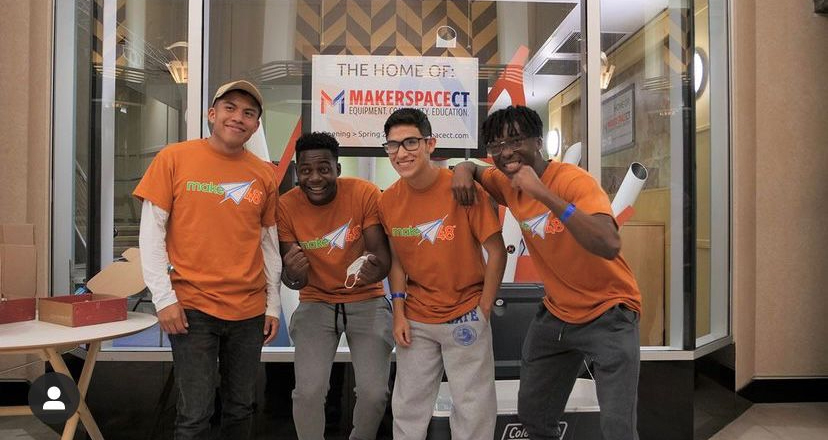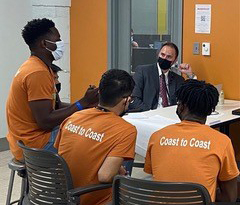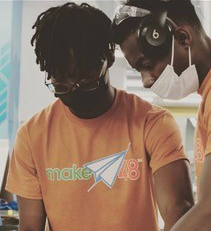Trinity Engineering Students Compete in ‘Make48’ Invention Challenge
Trinity College engineering majors Dirceu Boca ’23, Lincoln Chapata ’23, Gustavo Sanchez ’23, and Victor Vasquez ’23 teamed up to participate this fall in Make48, a national collaborative inventor challenge.
In each Make48 event, held in cities across the country, teams of “Makers” compete to develop a new commercial product in a 48-hour invent-a-thon weekend. They have two days to plan, prototype, and pitch a new idea, all within the specifications of an assignment. Teams are able to use a variety of tools, materials, work spaces, and expert guidance provided by a resource-rich fabrication workshop.

The team of Trinity students, called “Coast to Coast,” was among eight teams chosen to compete at MakerspaceCT in Hartford on October 7 to 9, 2021. The top two winning teams from the Hartford event will advance to compete at the Nationals competition, slated for March 2022, where one team can win $10,000. The Hartford competition challenged teams to create a brand new idea under the theme of “Outdoor Lifestyle.” The teams cannot discuss details of their creations for 90 days after the competition, when the winners are announced.
Assistant Professor of Engineering Kevin Huang ’12 told the students about this challenge and encouraged them to apply. “They went through interviews and a vetting process, so I was really proud that they were selected. It takes initiative and a lot of confidence in yourself to participate in something like this,” Huang said. “The four of them spent 48 hours working. They requested some materials, which I happily lent to them for the event. The fact that these types of opportunities exist for our engineering students is pretty amazing, and I’m glad that they participated in this unique experience.”
Huang said that Trinity offers many co-curricular, extra-curricular, and other robotics- and engineering-related activities for students. “The annual Trinity College International Firefighting Robot Contest brings students and graduate students from around the world to campus to compete,” Huang said. “Tech Savvy is another program many students are involved in; local middle school girls come to Trinity and participate in STEM activities. Engineering students have even taught local primary and secondary education teachers a robotics curriculum they can teach in their own classrooms.”
There are several student organizations in the Engineering Department: “The Trinity College Robot Study Team designs and builds robot devices to enter into competitions,” Huang said. “The Trinity College IEEE Robotics and Automation Society focuses on using robots for outreach and demonstrations. They have even successfully pitched a proposal to the IEEE Connecticut Executive Committee to receive external funding. These students are engaging with outside sources to solve real-world problems using technical and communication skills they’ve learned at Trinity.”
Engineering students also have internship and research opportunities. “There is a disproportionate number of students going to graduate school because the research opportunities Trinity offers allow them to create a strong research portfolio,” Huang said.
Trinity is accredited by the Engineering Accreditation Commission of ABET for its Bachelor of Science degree in the Engineering Department. The four concentrations of the engineering major are mechanical, electrical, biomedical, and computer engineering. “With all the concentrations, there are hands-on lab experiences. Each student will also participate in developing, designing, and implementing their own yearlong capstone design program,” Huang said.
Below, read more about the students’ Make48 experiences in their own words:
Why did you decide to apply to the Make48 event?
 Lincoln Chapata ’23, computer science and engineering major (concentration in computer engineering), from Zimbabwe: When the professor reached out and told us about the event, I didn’t know much about it. I did some research about it along with my friends. That was when we realized this might be an opportunity to meet up with people that are into engineering and we can actually be hands-on and create something that can be important and have a reward.
Lincoln Chapata ’23, computer science and engineering major (concentration in computer engineering), from Zimbabwe: When the professor reached out and told us about the event, I didn’t know much about it. I did some research about it along with my friends. That was when we realized this might be an opportunity to meet up with people that are into engineering and we can actually be hands-on and create something that can be important and have a reward.
What was it like to only have 48 hours to create something?
Chapata: It was terribly good. It’s an amazing group of people involved. The thinking and creating process is happening in 48 hours, which was pressurizing. We were staying in the lab until 3 a.m. and waking up at 6:30 a.m. There were people supporting us, making everything a bit easier. Seeing other people going through the same thing you are is comforting.
Gustavo Sanchez ’23, computer science and engineering major (concentration in mechanical engineering), from Chicago: It was stressful competing against other people with 40 years of experience in the field. I thought it was a good challenge because you have a lot of people with different ideas on different teams, with different age groups competing against each other.
How did what you’ve learned at Trinity help in the competition?
Dirceu Boca ’23, computer science and engineering major (concentration in mechanical engineering), from Mozambique: It’s a shame we can’t talk about what we made yet because what we made came directly from an experience we had in our Engineering 120 course at Trinity with Professor Huang.
Sanchez: Professor Huang, who taught our freshman engineering course, really prepared us. He made us think outside the box about design and cost and time, which was very helpful.
Why did you declare engineering as your major?
 Chapata: Growing up, I was interested in computer stuff. I wanted to have an impact in the medical field, but I didn’t want to be a doctor. I want to invent or provide services to hospitals and clinics at the cheapest cost possible, to improve our healthcare. My motivation to become an engineer is all about helping people and making an impact.
Chapata: Growing up, I was interested in computer stuff. I wanted to have an impact in the medical field, but I didn’t want to be a doctor. I want to invent or provide services to hospitals and clinics at the cheapest cost possible, to improve our healthcare. My motivation to become an engineer is all about helping people and making an impact.
Victor Vasquez ’23, engineering major (concentration in mechanical engineering), resides in Los Angeles: Ever since I was a little kid, I wasn’t into reading books; I was always a number and science guy, so I knew I wanted to do something with math and science. Engineering is a big career field, so that is what I chose. Once I took engineering courses here at Trinity freshman year, I saw what was going to be offered here could lead me to a career in the engineering field.
What do you think you gained from this experience with Make48?
Boca: I got better at working in a high-stress environment, where things are fast-paced. I learned about teamwork with a time constraint. Your partners are stressed and you are stressed and that can go downhill fast, so we needed teamwork.
Chapata: How to collaborate with my teammates. You discuss ideas, and if one of you doesn’t have an idea, the other one does. It’s amazing how minds can work. Right when someone comes up with an idea, there are more ideas and you realize, ‘Why didn’t you have these ideas before?’ At one point, I felt I was in a real industry’s working space. The major skills that were being tested constantly were communication, asking for help, and accepting criticism.
How do you think this experience might influence or relate to your career goals?
Boca: In the industry I’m interested in, which is working with cars, you have to work with customers and make products that are going to sell. With the Make48 experience, I got a lot of insight in that whole process and how it works.
Vasquez: This was my first time participating in an engineering competition like this, where we had to design and then create something, and we were competing as a group of friends, so we really utilized teamwork and communicating. In the beginning, we didn’t all have the same idea and there were some disagreements on stuff, but we all came around to our idea. We had to communicate and compromise with our ideas. We knew at the end of the day it was all about the team, not individuals.
